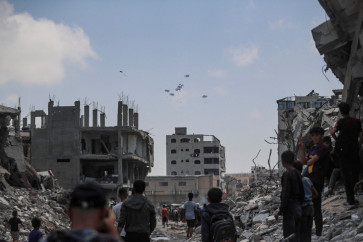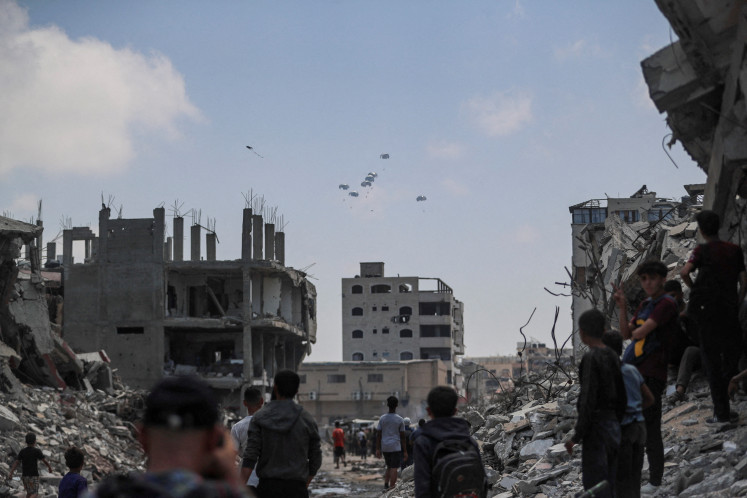Popular Reads
Top Results
Can't find what you're looking for?
View all search resultsPopular Reads
Top Results
Can't find what you're looking for?
View all search resultsSick squatters dying amid ruins of Pasar Ikan
Home sweet home: Children have a chat inside a tent serving as a makeshift home for squatters in the Pasar Ikan area of North Jakarta on Friday
Change text size
Gift Premium Articles
to Anyone
H
span class="caption">Home sweet home: Children have a chat inside a tent serving as a makeshift home for squatters in the Pasar Ikan area of North Jakarta on Friday. The squatters decided to resettle by erecting tents and semi-permanent houses in the area after non-active Jakarta governor Basuki “Ahok” Tjahaja Purnama ordered the eviction of people from hundreds of houses at Pasar Ikan on April 11 last year to revitalize the fishermen’s neighborhood.(JP/Kharishar Kahfi)
Many residents evicted last year from Pasar Ikan, North Jakarta, have decided to resettle illegally in the area, although at a great risk to their health, with four squatters having already died from a lack of healthy food, clean water and decent housing.
Sai, 56, is one of the squatters whose family has been living in the inhospitable environment after resettling in the area by erecting a makeshift building, where she currently lives with her husband and children.
They returned to Pasar Ikan after the now non-active Jakarta governor Basuki “Ahok” Tjahaja Purnama ordered the forced eviction of hundreds of residents from the area on April 11 last year to improve the poor fishermen’s neighborhood.
Since returning, Sai said that her family has survived on an unhealthy diet and little clean water.
“We usually eat fried tempe [fermented soybean]. Sometimes, it’s only instant noodles for all of us,” she said.
The family’s income was not sufficient for covering all needs, including food and water. “My family’s only income is from my daughter who works in the garment business. She gets paid
Rp 30,000 [US$2.24] a day.”
The family also has to spend money on clean water. Since the eviction, the squatters only have two choices to get clean water: extracting ground water or buying it from nearby water sellers, who charge Rp 5,000 for a jug.
“How could we fulfill our needs with so little money?” Sai asked.
The lack of proper food and clean water has resulted in several health problems for many people, apparently causing four squatters to pass away over the last three weeks because of severe illnesses.
The four victims are Anton, 45, and Untung, 53, both of whom died of hypertension-related diseases, Eka Juanti, 22, who passed away because of malnutrition, and Supina, 49, who died because of a lung disease.
“Eka suffered from a potassium deficiency. Her body
was so thin when she died,” said Boyke Setiawan, a doctor who gives the squatters medical examinations.
During the last examinations in April, he found that most children in Pasar Ikan suffered from skin diseases. Boyke said he suspected the diseases were caused by the humid condition of the area during the rainy season.
“They could also be caused by the dirty water they had to use in the area,” Boyke said.
He added that most adults suffered from gastritis and hypertension because of the high level of stress caused by the harsh living conditions. According to observations by The Jakarta Post, a tent that serves as a makeshift house could be occupied by up to five families.
“Living in semi-permanent houses made of plywood might be too uncomfortable for them. It could also make them stressed,” Boyke said.
The squatters’ representative, Upi Yunita, said that several people, including politicians, had provided them with food and tents. Jakarta governor-elect Anies Baswedan and his deputy-elect, Sandiaga Uno, visited the area once when they were running for the capital’s top seats.
“I have yet to see them here again after the election,” Upi said.
Separately, Jakarta secretary Saefullah said that the administration had provided the squatters with low-cost apartments that were in better condition than their makeshift homes and dormitories.
“They shouldn’t force themselves. We prioritized the Rawa Bebek apartments [in East Jakarta] for them,” he said.
However, Siti Aisah, a 42-year-old squatter, said that her new life in an apartment was worse than her previous one in Pasar Ikan, as she was not able to make a living when she lived in Rawa Bebek.
“I can’t pay for my rent. I’d rather stay here [in Pasar Ikan],” she said. (kuk)










